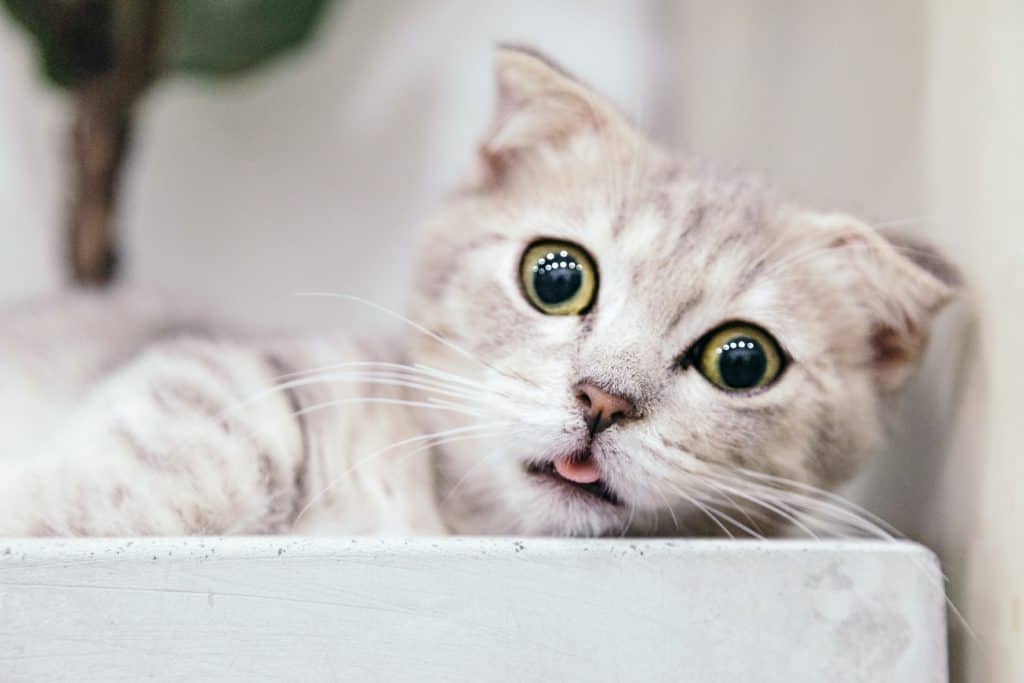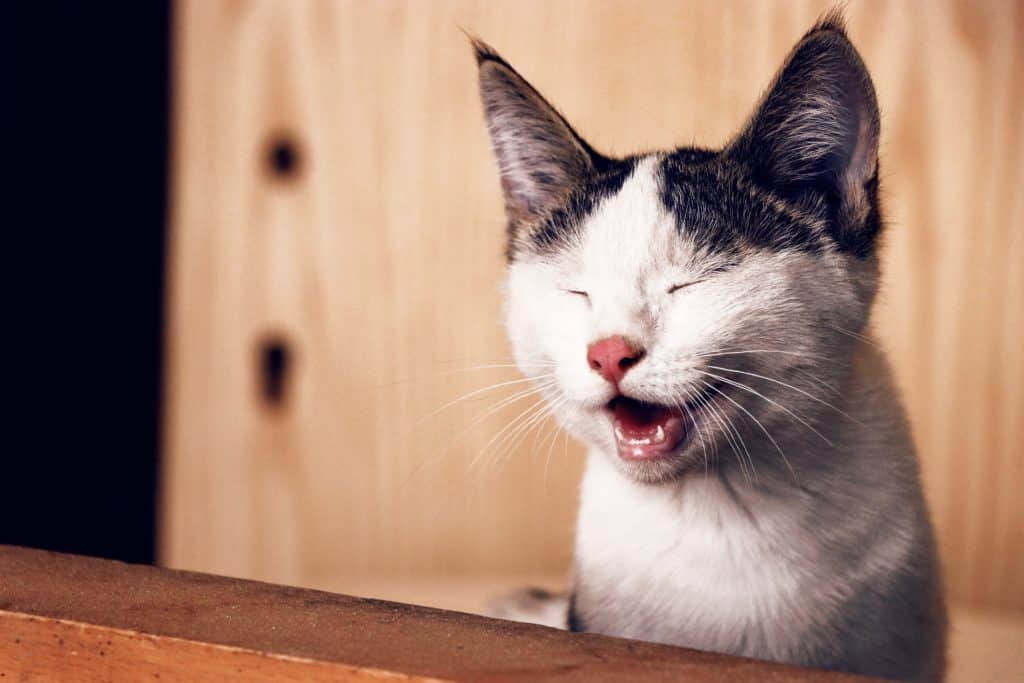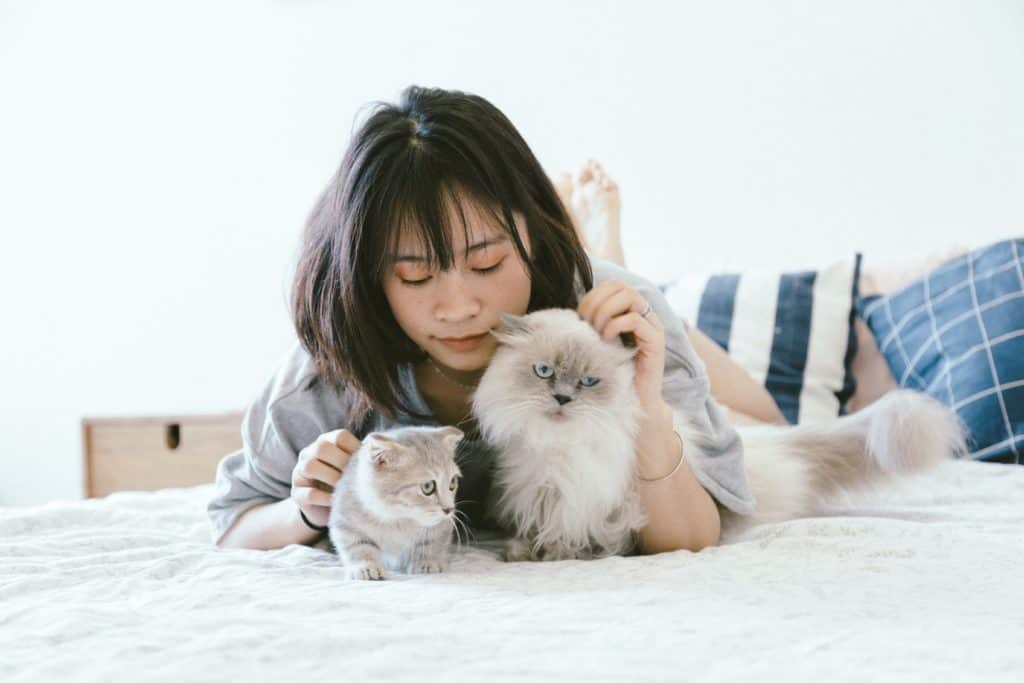Purring is one of the most recognizable signs of a cat’s contentment. It sounds like a pleasurable gasp after petting or feeding a cat. When your cat doesn’t purr, you may ask yourself “why is it that my cat doesn’t purr?” or “why did my cat stop purring?” Let’s address these issues.
Contents
My Cat Doesn’t Purr: Why Did My Cat Stop Purring?
When your cat stops purring, it could be unhappy, stressed, or satisfied. If you notice a change in your cat’s behavior or appetite, see your veterinarian as there might be serious health problems with your pet.

Pets purr because it’s their way of communicating. However, if your cat doesn’t purr, it could be due to:
Stress
A stressed feline will not purr. Being unhappy, your cat may feel more aggressive or alert, causing him to be more protective of himself. Sources of stress include:
- The arrival of a baby in your home that feels like there’s an intruder.
- Strangers or a new partner that split your attention.
- A change in your household routine.
- Work-related changes that prevent him from spending time with you.
- Being chased or startled.
- Loud noises.
- New food or diet.
- Loss of a loved one, either a cat or a person.
Some pets are territorial, while others are chill with changes. If your cat’s eating habits or mood worsens, consult a veterinarian because it could impact his immune system.
Satisfaction
While some cats show their gratitude by purring, others become silent after getting what they want. For instance, they’ll sleep or play and stop purring once they’ve eaten.
Injury
Injuries like fractures or an infected tooth can make your pets unhappy. They may whine or hide in silence as a protective mechanism. In this case it’s best to visit us for a veterinarian checkup.

Illness
Similar to injuries, illnesses like upper respiratory infections can cause pain to pets, making them unable to purr. If you notice lower energy, consult a veterinarian.
Old Age
Unlike kittens that produce the loudest sound, senior cats become tamer and calmer, which means they rarely purr or the sound they make is quieter.
What To Do When Your Cat Stops Purring
To motivate your pet to purr, try these simple ways:
- Petting: Stroke your cat behind its ears, under its chin, or on its back.
- Cuddle: Lie next to your cat when he’s resting or napping.
- Talking: Talk gently or sing lullabies to your cat.
- Make Them Feel Comfortable: Pets love kneading soft surfaces, so give them a pillow for them to burrow their faces and knead away.
- Provide Space: Avoid looking directly into your cat’s eyes as they might perceive this as aggression or a threat.
Is Not Purring a Sign of Unhappiness?
Not purring is not a sign of unhappiness because some cats don’t purr at all. When your pet stops purring, then maybe purring isn’t his method of communication.
Some cats also produce a soft purr, making it difficult to hear. If you no longer hear the sound, there might be a health problem. So consult a veterinarian.
Why Domestic Cats Purr
There are several reasons why cats purr. Newborn kittens are usually born blind and deaf so they rely on the vibrations of their mother’s purr to guide them to suckle.
When these kittens become grown cats, a purr may take on other functions like asking for attention from their owners. Cats may also purr when they’re angry or ill.
How Is a Cat’s Purr Produced?
A cat’s purr is produced by fast contractions of the voice box or larynx. That said, kittens purr when they’re eating, exhaling, and inhaling.
The only time cats don’t purr is when they’re sleeping. Cats may not produce a purring sound if they have a deficit in their respiratory system or vocal cords.

What Makes Cats Purr?
While purring is done to benefit both humans and mother cats, felines may purr when they’re relaxed or scared, being nursed on or nursing, meeting a new kitty, or when females are experiencing labor pains.
Advantages of Cats’ Purr
A cat purr can help human beings recover from different ailments. That’s why a cat is usually used as a therapy animal in hospitals. A purr can:
- Minimize muscles and bones’ healing time
- Minimize the risk of heart attack
- Lower blood pressure and stress
Interesting Facts About Cat Purrs
- Domesticated pets purr at a frequency of 25-150 vibrations per second. Sound frequency within this range is therapeutic for healing wounds and relieving pain.
- Vocal cords produce purrs at a frequency that stimulates muscle and bone growth.
- A cat’s purr is produced by blood flowing through a vein in the kitty’s chest cavity.
- The cat purr releases endorphins that calm and soothe the cat when they’re distressed.
- A purr may reduce depression and lower blood pressure in humans.
Frequently Asked Questions
What Does It Mean When a Cat Makes a Vibrating Noise?
A cat may make a vibrating noise when snuggling next to mom for food and warmth or when soothing themselves or their owners.
Why Is My Cat Vibrating but Not Purring?
If your cat is vibrating and not purring, it may be due to fear or anger. That being said, it’s important to understand that vibration in cats comes from their laryngeal muscles and not from their vocal cords or mouth, this can help you tell one from the other.
Final Thoughts
Purring depends on the cat. Since you may not be able to make your cat purr all the time, pay attention to their needs to ensure they’re happy and healthy.
